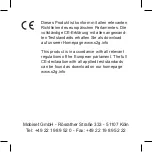
NI 5412 Calibration Procedure
|
© National Instruments
|
7
External Calibration Options
External calibration involves both verification and adjustment. Verification is the process of
testing the device to ensure that the output accuracy is within certain specifications. You can use
verification to ensure that the adjustment process was successful or to determine if the
adjustment process needs to be performed.
Adjustment is the process of measuring and compensating for device performance to improve
the output accuracy. Performing an adjustment updates the calibration date, resetting the
calibration interval. The device is guaranteed to meet or exceed its published specifications for
the duration of the calibration interval.
This document provides two sets of test limits for most verification stages, the
calibration test
limits
and the
published specifications
. The calibration test limits are more restrictive than the
published specifications. If all the output errors determined during verification fall within the
calibration test limits, the device is guaranteed to meet or exceed its published specifications for
a full calibration interval (two years). For this reason, you must verify against the calibration test
limits when performing verification after adjustment.
If all the output errors determined during verification fall within the published specifications, but
not within the calibration test limits, the device meets its published specifications. However, the
device may not remain within these specifications for another two years. The device will meet
published specifications for the rest of the current calibration interval. In this case, you can
perform an adjustment if you want to improve the output accuracy or reset the calibration
interval. If some output errors determined during verification do not fall within the published
specifications, you must perform an adjustment to restore the device operation to its published
specifications.
section describes the recommended calibration procedure. The
section describes alternate procedures that allow you to skip adjustment if
the device already meets its calibration test limits or published specifications.








































